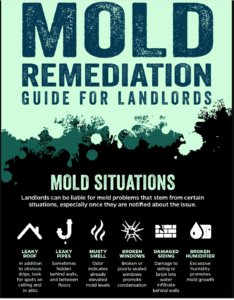 Seeing mold in your rental house in Virginia (or apartment)? You might be surprised as to what the commonwealth of Virginia requires and doesn’t require landlords to do when mold is a problem.
Seeing mold in your rental house in Virginia (or apartment)? You might be surprised as to what the commonwealth of Virginia requires and doesn’t require landlords to do when mold is a problem.
The relationship between a landlord and tenant can be eventful enough with the regular maintenance of a rental property; add mold to the mix, and you’ve got a rental situation nobody envies. Not only can mold create health complications for tenants and property owners, but it can bring about costly repair bills for the dwelling.
A lot of people rent their home. More than a third of U.S. residents were renters in 2017, according to Governing.com.
With this many people renting, the issue of mold and tenant/landlord responsibilities is bound to come up. Knowing your responsibilities as a tenant or landlord can be helpful and possibly ward off a lot of uneasy conversations. So, let’s dive in.
How To Prevent Mold in Rental Houses & Apartments in Virginia
On The Front End (Prevention)
We wouldn’t be a responsible mold remediation company if we didn’t show you how to check for mold in your rental property.
Mold infestation is a result of an uncontrolled moisture problem, whether its from a wet carpet pad that never dried completely or a leak in the roof that allowed water to pool in your ceiling and bring on the microfungi growth. Thankfully, mold can be prevented, as long as building maintenance and good tenant practices are employed.
For landlords: Prepping the tenant and making sure they know the signs of mold so he or she they can report it to the landlord as soon as the mold is spotted is paramount.
For landlords and tenants: Mold can appear as quickly as 48 hours after water damage happens, and it’s even more of a risk if it’s in a hard-to-spot area (e.g. a leaky pipe under the kitchen sink). Know when you should test for mold in the air.
Getting insurance to pay for mold remediation isn’t always as straightforward as one may think. Read up on the circumstances regarding homeowners insurance and mold claims.

See a helpful American Apartment Owners Association graphic covering best practices for cleaning up mold at https://www.american-apartment-owners-association.org/wp-content/uploads/2016/10/mold-v3.jpg.
If You Find Mold In Rental Houses In Virginia
Let’s look at the Commonwealth versus the Feds.
Federal requirements for Landlords
Legal liability for mold remediation, at the federal level, is nonexistent. The U.S. Environment Protection Agency (EPA) holds no standards or regulations for mold.
Housing Codes & Landlord-Tenant Laws For Mold in Rental Houses in Virginia
Two types of policies that govern mold in rental properties are housing codes and landlord-tenant laws. While housing codes are usually enforced by local health and housing agencies, landlord-tenant laws are typically enforced when someone sues in civil court, according to the Environmental Law Institute (ELI).
“Landlord-tenant laws set forth the rights and responsibilities of landlords and tenants, including responsibility for maintaining the premises. Unlike housing codes, these laws are typically enforced privately. They provide legal recourse for landlords and tenants to address violation of the laws, including the failure to remedy substandard housing conditions.” –Environmental Law Institute
You can see the following information in more detail at ELI’s website, but here are the highlights of Virginia’s mold laws from the Virginia Residential Landlord-Tenant (VLRT) Act (Virginia Code § 55.1-1200 et seq.), which applies to all dwelling units in the commonwealth.
Under the VLRT Act:
- “Where there is visible evidence of mold, the landlord shall promptly remediate the mold conditions . . . [in accordance with “professional standards” as described in separate state law, Virginia Code § 8.01-226.12]
- Mold must be remediated by the landlord within five days of disclosure to the landlord, upon initial move-in. Five days after move-in is all the time landlords have to provide a move-in report that discloses “whether there is any visible evidence of mold in areas readily accessible within the interior of the dwelling unit.”
- Landlords must “maintain the premises in such a condition as to prevent the accumulation of moisture and the growth of mold and to promptly respond to any notices [from a tenant].”
- They must maintain the property in accordance with the standards set forth in separate state law, Virginia Code § 8.01-226.12.
- Landlords are required to reinspect the unit to confirm that there is no more mold.
- Landlords are required to provide tenants with mold remediation info for the unit during the tenancy, and upon request of the tenant, to provide the full “information and reports not protected by attorney-client privilege.”
- If mold “materially affects the health or safety” of tenants, a landlord may require the occupants to stay elsewhere for up to 30 days while VLRT-compliant mold remediation takes place.
Get the full picture of mold remediation responsibility for landords in Virginia.
Disclaimer: MoldGone is not the authority on Virginia laws. We have provided resources that we believe would help landlords and tenants; the reader, however, should consult their local government and/or a local attorney.
What Type Of Mold Do You Have In Your Virginia Rental House
Think you’ve spotted mold in your Virginia rental property? Figure out what kind of mold you’re likely dealing with, and if it’s something you can clean up yourself.
MoldGone Can Help You Get Rid Of Mold In Rental House In Virginia
If you would like an internationally accredited, customer-focused mold remediation team to inspect or treat a mold problem in your rental unit, schedule an appointment today.

My daughter is in a home she is renting. She has rented this home for 12 years. When me her mom Emily was cleaning her grandsons room there is mold in closet and looks like the roof is leaking along with mold in ac unit as well as water flooding basement. Landlord has a attitude and has not done anything and my daughter said her dog has been sick this whole weekend and my grandchildren and my daughter have been sick since the weekend. What rights does my daughter and her family have?
Emily,
Thanks for the inquiry. Unfortunately, we don’t claim to be lawyers and thus don’t give legal advice. We are sorry to hear about the issue you and your family are facing and recommend that you consult an attorney for the rights you may have on this matter.
In the meantime, if you do need help taking care of the mold issue, please don’t hesitate to call our team.
Should more testing been done in your apartment after three termite infestations are like activity over five year period
Connie,
Thank you for your question. Termites require a moisture source to survive so they can be indicative of a moisture intrusion or ongoing issue. Having termites doesn’t necessarily mean mold testing is required but it could be a good idea if the property owner suspects a moisture problem.